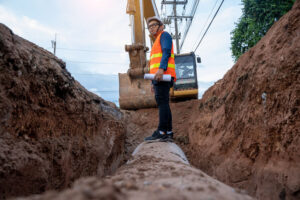
Pipelines run beneath our streets, cities, continents, and oceans. Without them and the energy resources they deliver, modern-day conveniences wouldn’t be possible. The pipeline network in the U.S. transport various products such as sewage and water; however, the most common products transported are for energy purposes, including natural gas, biofuels, and liquid petroleum. Pipelines exist throughout the country, and they vary by the goods transported the size of the pipes, and the material used to make pipes.
What are a Pipeliner’s Responsibilities?
Safety is the primary goal of the pipeliner or technician. They are responsible for the safety of all company personnel and the public at large. Environmental regulations require oil and gas companies to perform routine tests and maintenance on pipelines to meet all regulations and guidelines and perform optimally and safely. The pipeliner schedules and performs this work. A construction crew may takeover if a pipeline requires major repair or replacement. Otherwise, for most repairs, the pipeliner will handle them.
Their responsibilities will differ if the pipeliner or technician works for a construction crew. As part of a construction team, the pipeliner is responsible for preparing the locations for the pipeline to be laid, which can include removing obstacles such as fences and water lines, and cleaning and painting exposed metal to prevent corrosion.
Common Responsibilities:
- Schedule maintenance and surveys of pipelines and equipment.
- Ensure compliance of environmental and governmental regulations.
- Complete work orders.
- Report any unsafe conditions or situations.
- May be required to read and interpret drawings and schematics.
- Perform valve and valve operator maintenance tasks.
- Use hand power tools and other equipment.
Pipeliners can work for oil and gas extractors, refiners, and energy companies. There are jobs in just about every state in the country, with the highest concentrations in Louisiana, Texas, Pennsylvania, and Alaska. Pipelining work can be dangerous, so it’s important to have products that make the job easier.
If you need high-quality pipeline skids and mats for your next pipeline project, Ritter Forest Products can help. We rent hardwood and timber pipeline skids so you can keep your equipment and workers safe on the job.
Contact us today to get the products you need for your next construction project!








